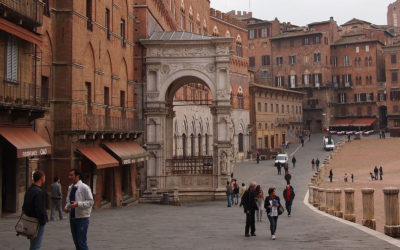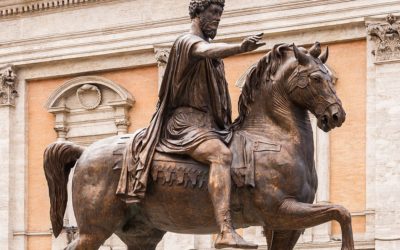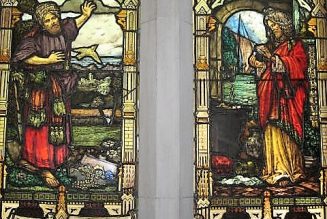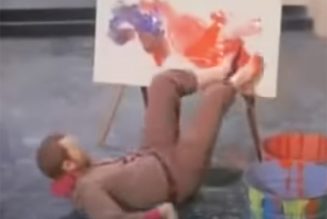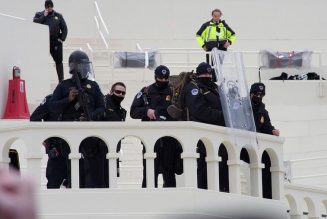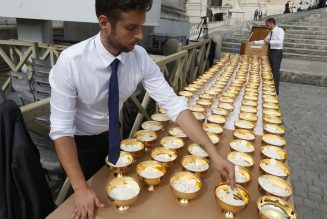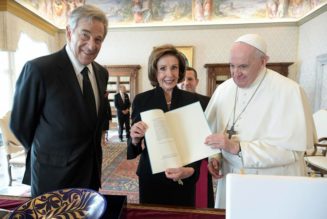“Courage: in all circumstances the ability to judge rightly about the nature and extent of dangers.”
“For instance, when Homer makes Odysseus strike himself on the chest, and ‘call his heart to order,’ saying: ‘Prudence my heart, you have put up with fouler than this.’” Plato, Republic
Fear is an essential human emotion, so it surely must have its proper place. Yet there are different kinds of fear, or ways of fearing, and it is hard to know how to fear well. It is especially difficult to think clearly about this when much of the fear that we experience probably needs to be set aside, or in any case transformed or redirected.
How do we recognize the difference between good fear and bad fear? This is a great question. The first step is to know that there is a difference. Often, the admonition we need to hear is “Do not be afraid.” But this is difficult, because we know intuitively that some fear is appropriate, and so we are challenged to discern which fear needs to be set aside and which doesn’t.
The current corona virus situation causes much fear in us. We realize that so much more could go wrong, and so many more people might be hurt, in various ways. Simply to say “there is nothing to fear” would be wrongheaded, even dangerous.
I love Plato’s approach to courage as the virtue that moderates and transforms fear. Courage consists, at least in part, in “the ability to judge rightly about the nature and extent of dangers.” This bears much consideration. Clearly, Plato does not mean that the courageous man is the one who can figure out all the facts of just how dangerous a particular situation is—though the courageous man will indeed make a reasonable effort to know what he needs to know.
Plato’s point takes us to a higher, more significant vantage. The courageous man has learned to judge different kinds of dangers in their relative importance. He has learned to fear what is most truly to be feared, and not to fear—at least not so much—things that are intrinsically less dangerous in the big picture.
Courage is always rooted in insight into the hierarchy of goods. It is rooted in wisdom, which grasps the primacy of living well over such goods as health, safety, and profit. The latter are not ignored. Rather they are seen and treated according to their own true, though limited value.
Plato quotes a gorgeous line from the Odyssey. Odysseus strikes his chest and says, “Prudence my heart, you have put up with fouler than this.” Implied is that the courageous man can judge just how foul things are or not, seeing all in the perspective of just how great certain things are.
The courageous man might fear the loss of lesser things, but that fear is transformed and given context by a richer, life-affirming fear of the loss of what is most important. And so he heeds the admonition “be not afraid” as especially applying to lesser though very real dangers and evils. He is steadfast in his commitment to higher goods, and in his confidence that they can still be achieved—even if he suffers terrible loss of lesser goods.
Courage is a cardinal virtue; it is one hinge on which swings the good life itself. It is a precious jewel sought in a life-long project. And it is cultivated precisely in the context of real dangers—lesser and greater ones—such as we face today. The courageous man learns to ‘overcome’ his fear of lesser but real dangers, while acting with conviction and confidence in the travails of life. Let us then encourage one another. We can learn that in a very real sense, we have nothing to fear—if we see things as they truly are..
Plato (427-347 B.C.), a student of Socrates, and teacher of Aristotle, is considered one of the greatest philosophers of all time. The Republic is one of the most widely read and influential of all books.
Image: Odysseus
“It was considered unpatriotic to hoard food.” It really struck me when my mother shared this memory from when she was a child during World War II. The war was an occasion for real soul-searching. Who am I, anyway? How is my life intertwined with that of others? How…
The Pythagoreans…call music the harmonization of opposites, the unification of disparate things, and the conciliation of warring elements…. They say that the effects and applications of [musical] knowledge reveal themselves in four human spheres: in the soul, in the…
Concentrate every minute like a Roman—like a man—on doing what’s in front of you with precise and genuine seriousness, tenderly, willingly, with justice. And on freeing yourself from all other distractions. Yes, you can—if you do everything as if it were the last…
Husband, father, and professor of Philosophy. LifeCraft springs from one conviction: there is an ancient wisdom about how to live the good life in our homes, with our families; and it is worth our time to hearken to it. Let’s rediscover it together. Learn more.

Join us!
Please enter your email address to receive a Wednesday Quote and Reflection once a week. I would be honored to be partners in mining the wisdom of the ancients.
You have Successfully Subscribed!


